Latest hostages released by Hamas have returned to Israel, Israeli military says
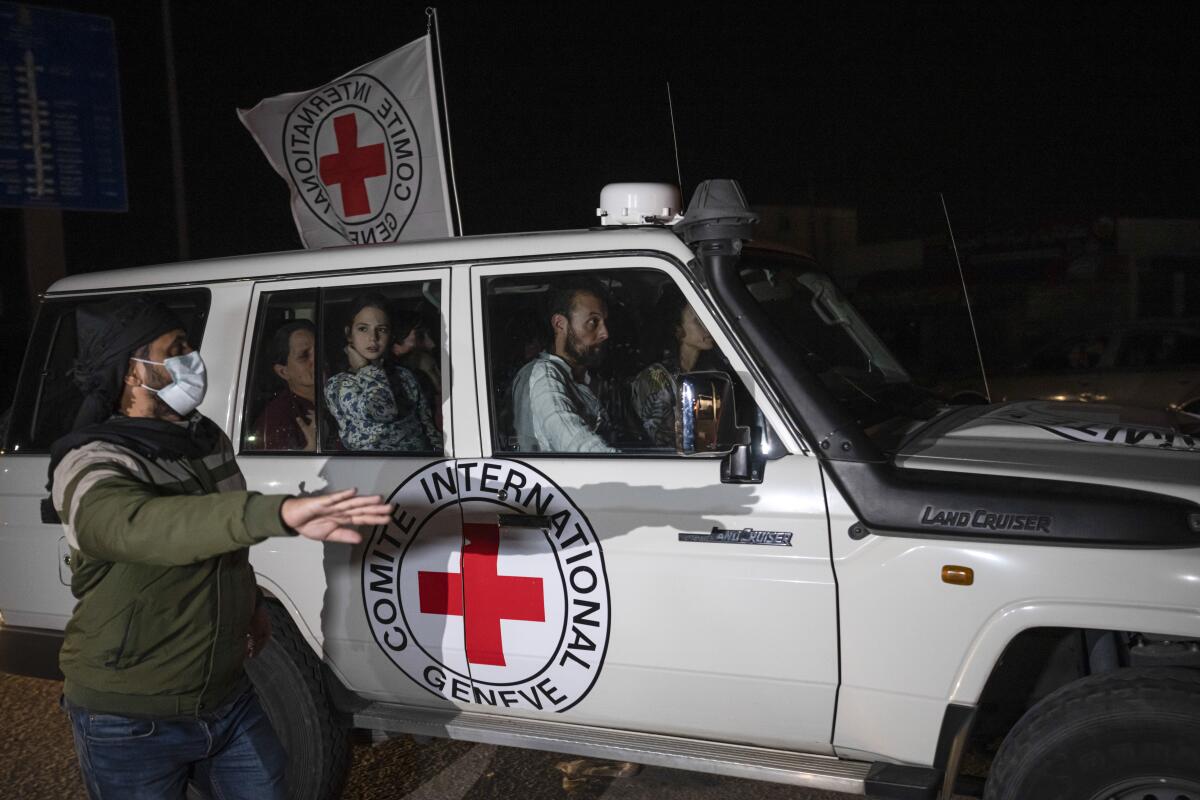
KHAN YUNIS, Gaza Strip — Hamas released 13 Israeli and four foreign hostages late Saturday in the second round of swaps under a temporary cease-fire deal, the Israeli military said, after the militant group initially delayed the exchange for several hours and said that Israel had violated the terms of a truce deal.
The Israeli military said the freed captives, including four Thais, had been transferred to Israel. They were being taken to hospitals for observation and to be reunited with their families.
Shortly after midnight, Israel began releasing 39 Palestinian prisoners to East Jerusalem and the West Bank as part of the exchange that ultimately went through after international mediation efforts.
The Israeli hostages released Saturday included seven children and six women, Prime Minister Benjamin Netanyahu’s office announced.
Most of the released hostages were from Kibbutz Be’eri, a community Hamas militants ravaged during their Oct. 7 cross-border attack, a spokesperson for the kibbutz said. The children ranged in age from 3 to 16, and the women ranged from 18 to 67.
It was a bittersweet moment for the residents of Be’eri. A kibbutz spokesperson said all the released hostages either had a family member killed in the rampage or had left a loved one in captivity in Gaza.
The mother of one of the released hostages, 12-year-old Hila Rotem, remained in captivity, the spokesperson said.
Another, Emily Hand, is a girl whose father believed her to be dead for weeks before finding out she was held as a hostage.
Residents of the kibbutz have been staying together at a Dead Sea hotel since the Oct. 7 attack, which in total killed at least 1,200 people, mostly civilians, Israel says.
A large crowd gathered in a function room at the hotel late Saturday, cheering in excitement as they saw the first images of their loved ones being released.
One classmate of 18-year-old Noga Weiss said there was great excitement about her release.
“I was very nervous when I heard about the delay. I thought something would happen,” the classmate, identified as Zohar, told Channel 13 TV.
“It was a great relief when I saw her.”
In Jerusalem, released Palestinian Shurouq Duwiyat arrived at her home where joyous family members hugged and kissed her.
“We send a message to our people in Gaza that we stand by your side and support you,” Duwiyat told reporters inside her home.
Also in Jerusalem, Israeli troops evicted journalists who gathered outside the home of Israa Jaabis, who had been imprisoned since 2015 after being convicted of carrying out separate attacks on Israelis. Jaabis suffered severe burns on her face and hands during a bombing attack that also wounded an Israeli police officer.
After pushing away the journalists, Israeli troops raided the family home, kicking out all but the freed detainee and her parents. Israeli authorities have banned all celebrations for released prisoners and retainers.
Once police left, remaining journalists swarmed Jaabis, while family members draped her in a white, gold brocaded abaya and crowned her with flowers.
“It’s like a dream having her here,” said Jaabis’ sister, Batool.
Hundreds of Palestinians waited in the West Bank town of Beitunia for the arrival of additional prisoners.
The last-minute snag had created a tense standoff on the second day of what was meant to be a four-day truce.
By nightfall, as the hostages should have emerged from Gaza, Hamas alleged that the aid deliveries permitted by Israel fell short of what was promised and that not enough of the aid was reaching northern Gaza — the focus of Israel’s ground offensive and main combat zone. Hamas also said not enough veteran prisoners were freed in the first swap on Friday.
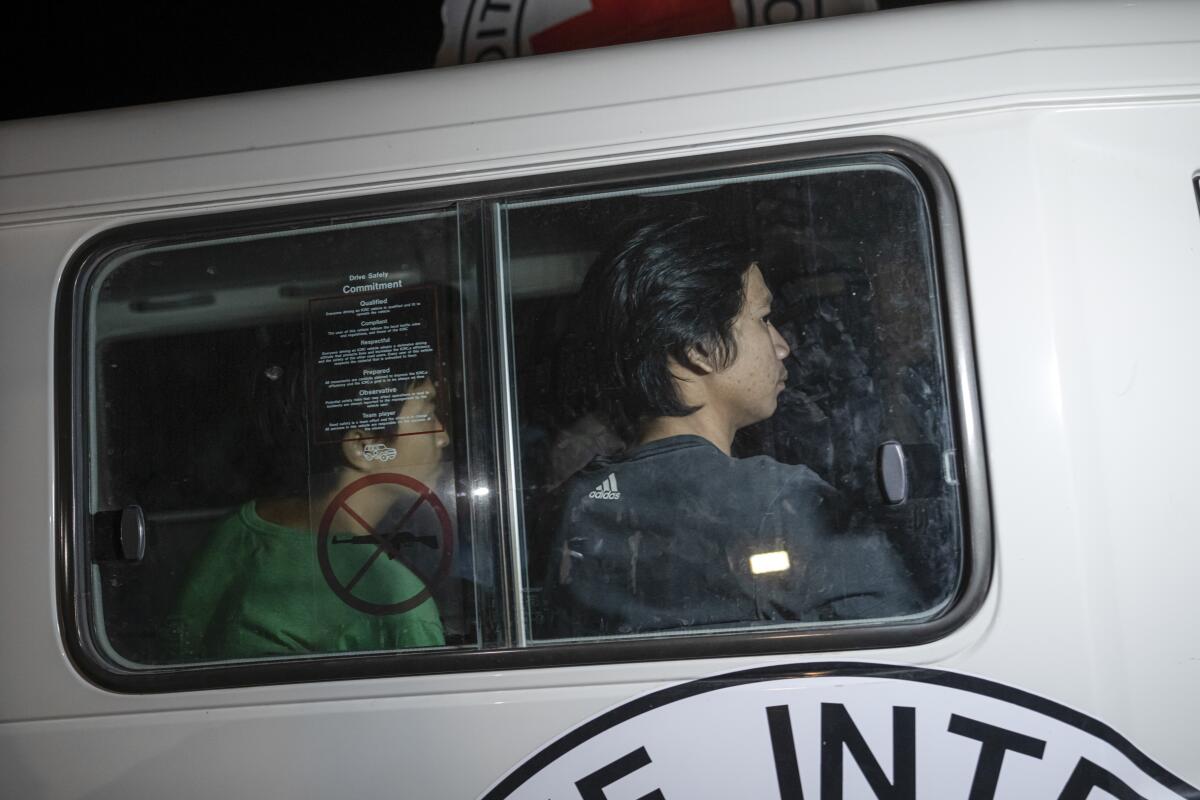
Until Saturday afternoon, it appeared everything was going according to plan.
Aid trucks were entering the Gaza Strip, Hamas handed a list of more than a dozen hostages set for release to mediators Qatar and Egypt, and the Israel Prison Service prepared a list of dozens of Palestinian prisoners to be released.
“This is putting the deal in danger and we have spoken to mediators about that,” Osama Hamdan, a senior Hamas official, said in Beirut.
But Egypt, Qatar and Hamas itself later said obstacles had been overcome, and Hamas issued a statement listing six women and 33 boys and teenagers it said were expected to be released by the Israelis.
On the first day of the temporary truce, Hamas released 24 of the roughly 240 hostages taken during its Oct. 7 attack on Israel that triggered the war, and Israel freed 39 Palestinians from prison. Those freed in Gaza were 13 Israelis, 10 Thais and a Filipino.
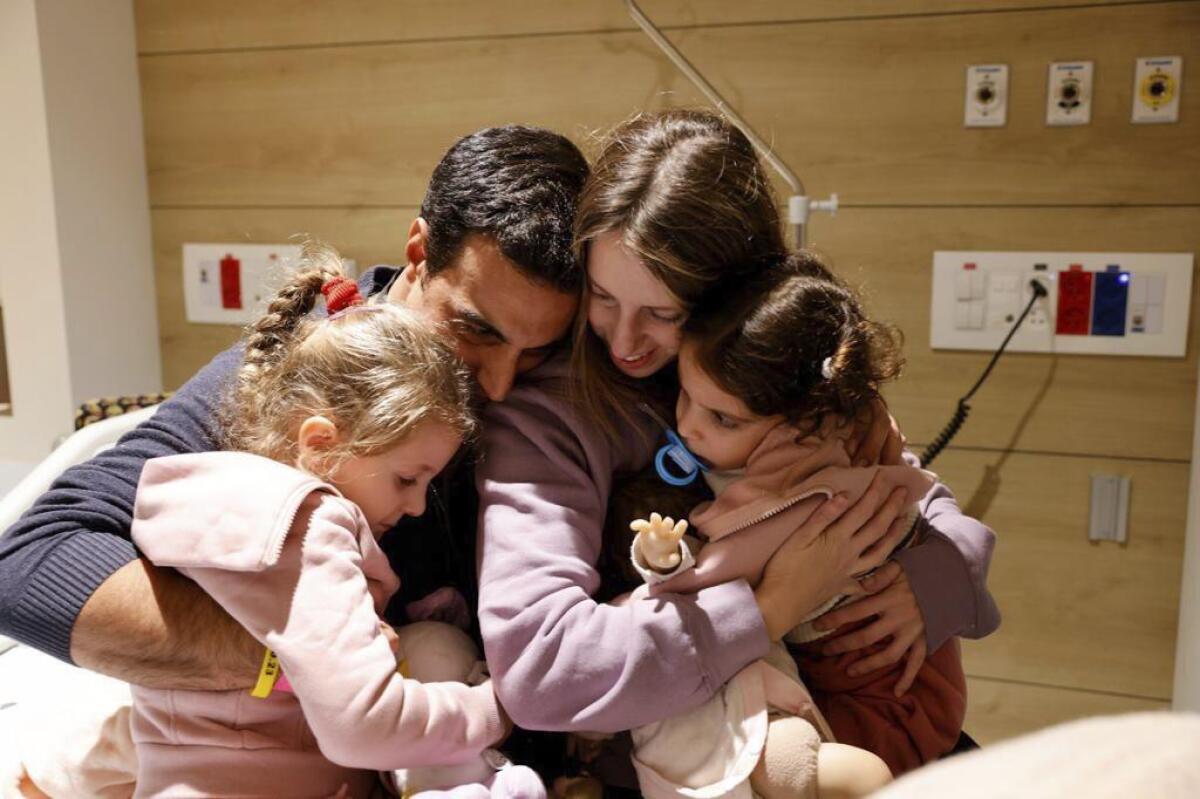
Overall, the plan has been for Hamas to release at least 50 Israeli hostages, and Israel 150 Palestinian prisoners, during the four-day truce — all women and minors, with three Palestinian prisoners to be freed for each hostage.
Israel has said the truce can be extended an extra day for every additional 10 hostages freed — something President Biden said he hoped would occur.
Biden spoke Saturday with Qatar’s emir and prime minister — Sheikh Tamim bin Hamad al Thani and Sheikh Mohammed bin Abdulrahman al Thani, respectively — the White House said, to discuss “hurdles” to the release of the hostages.
Israeli leaders have said they would resume fighting eventually and not stop until Hamas, which has controlled Gaza for the last 16 years, is crushed. Israeli officials have argued that only military pressure can bring the hostages home. But the government is under pressure from hostages’ families to make the release of the remaining captives the top priority.
More than 13,300 Palestinians have been killed in the Israeli offensive, according to the Health Ministry in the Hamas-run Gaza government. Women and minors have consistently made up around two-thirds of the dead, the ministry said, though the latest number was not broken down. The figure does not include updated numbers from hospitals in the north, where communications have broken down.
Fighting pauses in Gaza for a hostage-prisoner exchange. But Israel vows that the war will continue, and has shown no sign of relenting in its determination to destroy Hamas.
Separately, a Qatari delegation arrived in Israel on Saturday to coordinate with parties on the scene and “ensure the deal continues to move smoothly,” according to a diplomat briefed on the visit. The diplomat spoke on condition of anonymity because he was not authorized to discuss details with the media.
The start of the pause Friday morning brought the first quiet for 2.3 million Palestinians who have endured relentless Israeli bombardment that, in addition to leaving thousands dead, has driven three-quarters of the population from their homes and leveled residential areas. Rocket fire from Gaza militants into Israel went silent as well.
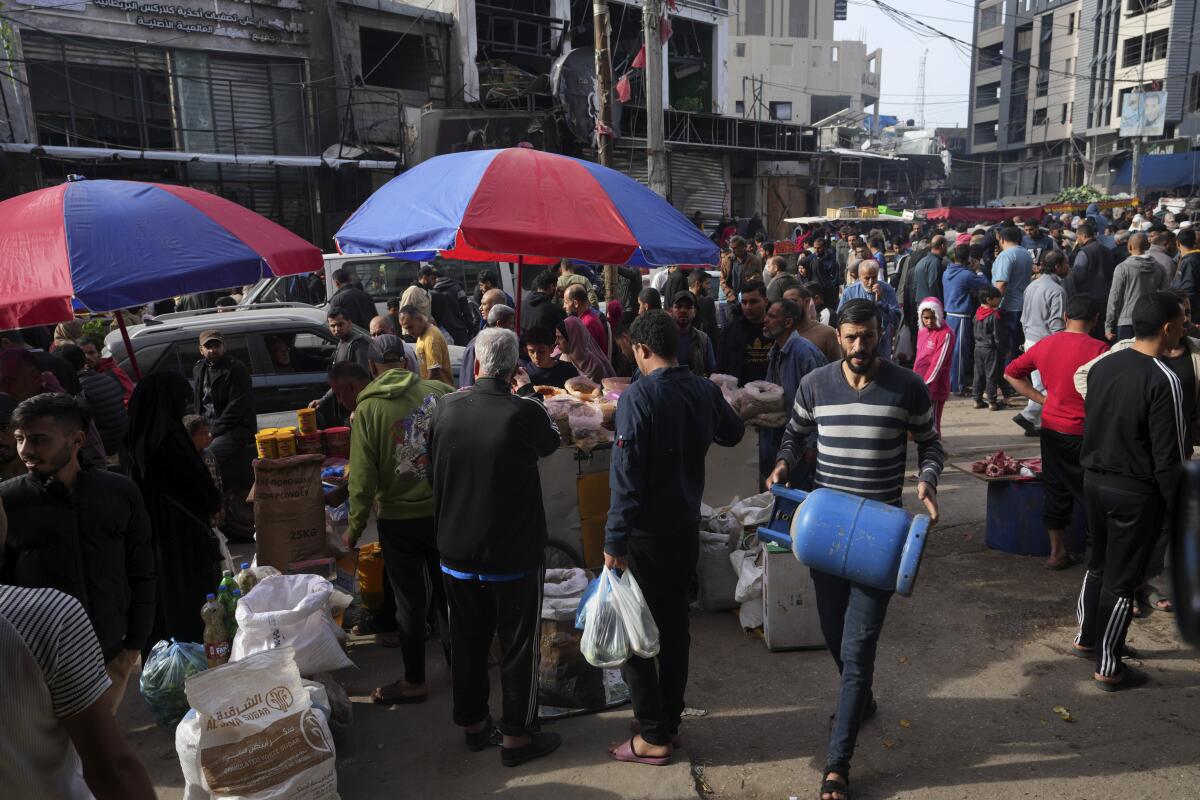
For Emad Abu Hajer, a resident of the Jabaliya refugee camp in the Gaza City area, the pause meant he could again search through the rubble of his home, which was flattened in an Israeli attack this month.
He found the bodies of a cousin and nephew, bringing the death toll in the attack to 19. With his sister and two other relatives still missing, he resumed his digging Saturday.
“We want to find them and bury them in dignity,” he said.
The United Nations said the pause enabled it to scale up the delivery of food, water and medicine to the largest volume since the resumption of aid convoys on Oct. 21. It was also able to deliver 34,078 gallons of fuel — just over 10% of the daily prewar volume — as well as cooking gas, a first since the war began.
In the southern city of Khan Yunis on Saturday, a long line of people with containers waited outside a filling station. Hossam Fayad lamented that the pause in fighting was only for four days.
“I wish it could be extended until people’s conditions improved,” he said.
For the first time in more than a month, aid reached northern Gaza, the focus of Israel’s ground offensive. The Palestinian Red Crescent said 61 trucks carrying food, water and medical supplies headed there Saturday, the largest aid convoy to reach the area since the start of the war.
The U.N. said it and the Palestinian Red Crescent were also able to evacuate 40 patients and family members from a hospital in Gaza City, where much of the fighting has taken place, to a hospital in Khan Yunis.
The relief brought by the cease-fire has been tempered, however, for both sides. For Israelis, by the fact that not all hostages will be freed. For Palestinians, by the brevity of the pause.
At least two Palestinians were injured Saturday at a tense West Bank checkpoint where Israel was to free prisoners. Israeli security forces fired tear gas and rubber bullets at Palestinians gathered at Beitunia checkpoint. It was not clear how the two were injured.
In Tel Aviv, several thousand people packed a central square called “the square of the hostages,” awaiting news of the second release.
“Don’t forget the others because it’s getting harder, harder and harder. It’s heartbreaking,” said Neri Gershon, a Tel Aviv resident. Some families have accused Netanyahu’s government of not doing enough to bring hostages home.
The hostages included multiple generations.
Nine-year-old Ohad Munder-Zichri was freed along with his mother, Keren Munder, and grandmother, Ruti Munder, who had been taken during the child’s visit to his grandparents at the kibbutz where about 80 people — nearly a quarter of community residents — are believed to have been kidnapped.
Hours later, 24 Palestinian women and 15 teenage boys held in Israeli prisons in the occupied West Bank and East Jerusalem were freed. In the West Bank town of Beitunia, hundreds of Palestinians poured out of their homes to celebrate, honking horns and setting off fireworks.
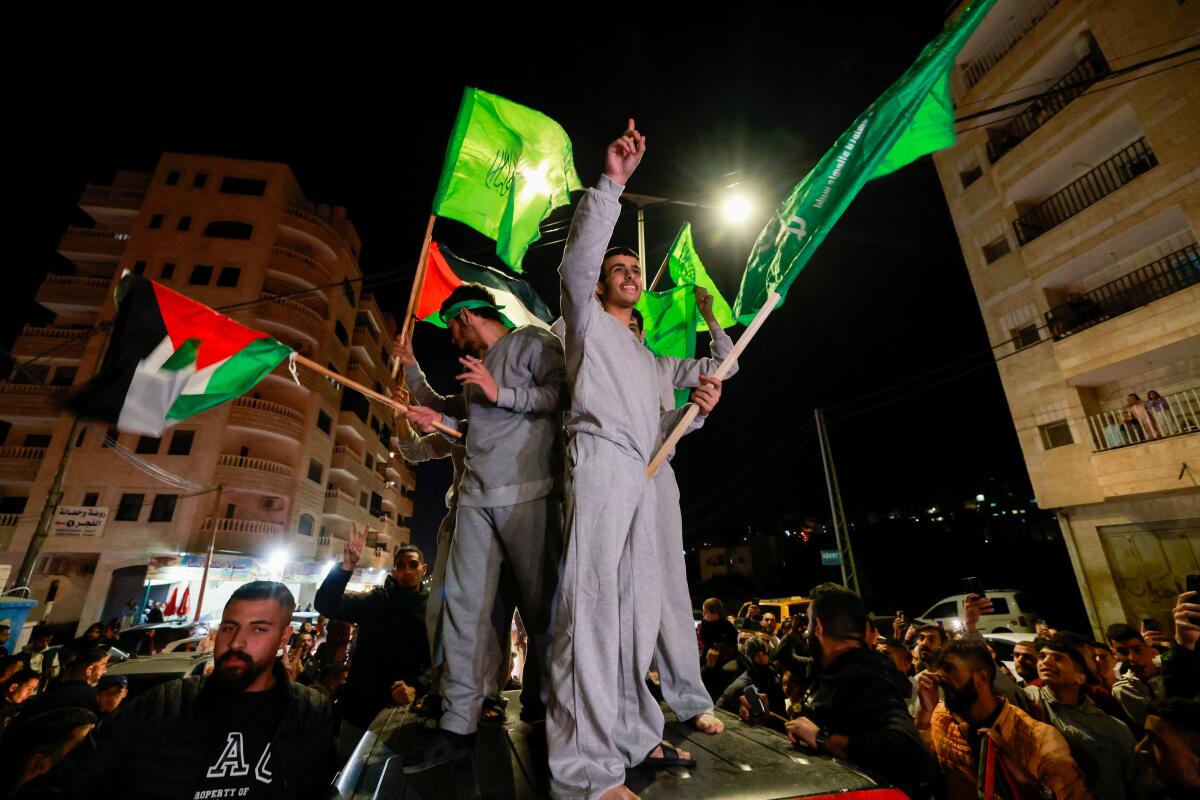
The teenagers had been jailed for minor offenses such as throwing stones. The women included several convicted of trying to stab Israeli soldiers.
“It’s a happiness tainted with sorrow because our release from prison came at the cost of the lives of martyrs and the innocence of children,” said one released Palestinian prisoner, Aseel Munir al Titi.
According to the Palestinian Prisoners Club, an advocacy group, Israel is holding 7,200 Palestinians, including about 2,000 arrested since the start of the war.
Times staff writer Nabih Bulos in Jerusalem contributed to this report.
More to Read
Sign up for Essential California
The most important California stories and recommendations in your inbox every morning.
You may occasionally receive promotional content from the Los Angeles Times.











